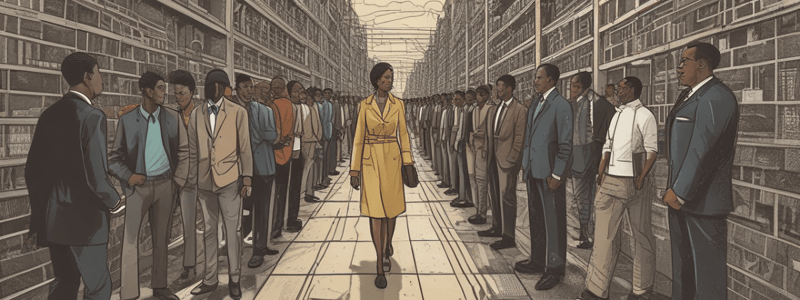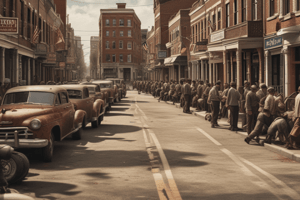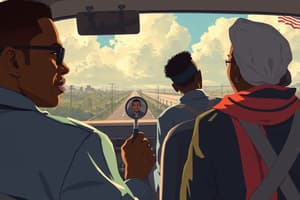Podcast
Questions and Answers
What did Marshall's example of an African American girl illustrate?
What did Marshall's example of an African American girl illustrate?
- Diversity in toy manufacturing
- Racial segregation in schools
- Importance of education in breaking segregation
- Loss of self-confidence among African American girls (correct)
What did the NAACP argue in their brief to the Supreme Court?
What did the NAACP argue in their brief to the Supreme Court?
- Separate but equal is a contradiction in terms (correct)
- Racial segregation promotes progress
- Segregation is necessary for social harmony
- African Americans prefer segregation
What did Chief Justice Warren's opinion emphasize?
What did Chief Justice Warren's opinion emphasize?
- The contradiction in 'separate but equal'
- The importance of racial segregation
- The need for gradual desegregation
- The clarity of the Court's decision for laymen (correct)
What was the outcome of the Supreme Court's decision in 1954?
What was the outcome of the Supreme Court's decision in 1954?
What event sparked a spectacular riot in 1954?
What event sparked a spectacular riot in 1954?
What was the purpose of 'Freedom Rides'?
What was the purpose of 'Freedom Rides'?
What effect did the Second World War have on African Americans' prospects?
What effect did the Second World War have on African Americans' prospects?
What was the outcome of the resistance to the Supreme Court's Brown decision?
What was the outcome of the resistance to the Supreme Court's Brown decision?
What was the consequence of refusing to enroll James Meredith at the University of Mississippi?
What was the consequence of refusing to enroll James Meredith at the University of Mississippi?
What was the purpose of the 'freedom rides'?
What was the purpose of the 'freedom rides'?
What issue did not rank high on President Kennedy's agenda at the beginning of his administration?
What issue did not rank high on President Kennedy's agenda at the beginning of his administration?
What event changed President Kennedy's priorities?
What event changed President Kennedy's priorities?
Who put Gandhian philosophy to the test through non-violent resistance?
Who put Gandhian philosophy to the test through non-violent resistance?
What was the result of the peaceful demonstrations in Birmingham, Alabama?
What was the result of the peaceful demonstrations in Birmingham, Alabama?
What hindered the passage of the civil rights bill?
What hindered the passage of the civil rights bill?
What did President Kennedy address the nation about?
What did President Kennedy address the nation about?
What is the focus of the speaker's message?
What is the focus of the speaker's message?
What is the consequence of overlooking the urgency of the moment?
What is the consequence of overlooking the urgency of the moment?
What is the goal of the Negro's struggle?
What is the goal of the Negro's struggle?
What will continue to shake the foundations of the nation?
What will continue to shake the foundations of the nation?
How should the Negro conduct their struggle?
How should the Negro conduct their struggle?
What is the relationship between the freedom of white people and Negroes?
What is the relationship between the freedom of white people and Negroes?
What should the Negro community avoid?
What should the Negro community avoid?
What is the speaker's final message?
What is the speaker's final message?
Who took over as president after Kennedy?
Who took over as president after Kennedy?
What was the benefit of civil rights legislation for LBJ?
What was the benefit of civil rights legislation for LBJ?
When did the Civil Rights bill become law?
When did the Civil Rights bill become law?
What was one of the powers given to the U.S. Attorney-General under the Civil Rights Act of 1964?
What was one of the powers given to the U.S. Attorney-General under the Civil Rights Act of 1964?
What was outlawed in public places and places of public accommodation by the Civil Rights Act of 1964?
What was outlawed in public places and places of public accommodation by the Civil Rights Act of 1964?
Who denounced the Civil Rights Act as 'the single most dangerous piece of legislation ever introduced in the Congress'?
Who denounced the Civil Rights Act as 'the single most dangerous piece of legislation ever introduced in the Congress'?
What was the name of the case where the appellant refused to let African Americans stay at his motel?
What was the name of the case where the appellant refused to let African Americans stay at his motel?
What was the outcome of the Supreme Court's decision in the Heart of Atlanta Motel case?
What was the outcome of the Supreme Court's decision in the Heart of Atlanta Motel case?
What is the core idea of the speaker's dream for the nation?
What is the core idea of the speaker's dream for the nation?
What does the speaker envision for their children in the future?
What does the speaker envision for their children in the future?
What is the speaker's vision for the state of Alabama in the future?
What is the speaker's vision for the state of Alabama in the future?
What does the speaker believe is the source of hope for the nation?
What does the speaker believe is the source of hope for the nation?
What does the speaker believe will happen when people work together towards brotherhood?
What does the speaker believe will happen when people work together towards brotherhood?
What is the speaker's dream for the future of the nation's valleys and hills?
What is the speaker's dream for the future of the nation's valleys and hills?
What does the speaker believe will happen to the people who work together towards freedom?
What does the speaker believe will happen to the people who work together towards freedom?
What does the speaker plan to do with the faith that they have?
What does the speaker plan to do with the faith that they have?
Study Notes
Racial Segregation and Education
- In 1954, a unanimous Supreme Court ruled that "separate but equal" has no place in the field of public education, citing the 14th Amendment.
- The court decreed that school desegregation should begin everywhere, allowing African Americans to claim admission to all-white institutions.
- Racial segregation was theoretically finished everywhere, but resistance and pockets of segregation remained.
The Civil Rights Movement
- After 1954, resistance to desegregation emerged, including the refusal of a university to admit a black woman, Meredith James, leading to a riot.
- The "Freedom Rides" movement began, where groups of young people traveled through the South by bus, defying segregation laws.
- Incremental legal changes and the effects of World War II improved the prospects and welfare of African Americans, but strong pockets of resistance remained.
- President Kennedy's role in the civil rights movement was ambivalent, with limited achievements, but he eventually addressed the nation, calling for comprehensive civil rights legislation.
Martin Luther King and Non-Violent Resistance
- Martin Luther King applied Gandhian philosophy to the civil rights movement, using non-violent resistance, including jail sentences, protests, and boycotts.
- King's "I Have a Dream" speech emphasized the need for unity, equality, and justice, calling for an end to racial injustice and discrimination.
The Civil Rights Act of 1964
- The Civil Rights Act of 1964 was passed on July 2, 1964, giving the U.S. Attorney-General new powers to intervene and protect citizens' rights.
- The Act established the mandate of the "Equal Employment Opportunity Commission" (EEOC) and the "Community Relations Service" (within the Department of Justice).
- The Act outlawed segregation in public places and in places of public accommodation, such as hotels and motels.
Challenges to the Civil Rights Act
- The Civil Rights Act was criticized by politicians and challenged in the courts, with some arguing that it exceeded Congress's power to regulate commerce under the Constitution.
- The Supreme Court ultimately upheld the Act in the case of Heart of Atlanta Motel v. United States.
Studying That Suits You
Use AI to generate personalized quizzes and flashcards to suit your learning preferences.
Related Documents
Description
This quiz explores the famous court case that led to the desegregation of American schools, highlighting the negative effects of racial segregation on self-esteem and opportunities.




